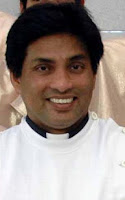Acts 12:1-11
Ps 34:2-3, 4-5, 6-7, 8-9
2 Tm 4:6-8, 17-18
Mt 16:13-19
This Sunday's Gospel reading describes the holy quality of "shepherding" that's required of those who are in Christian leadership. This includes not only our priests, but also lay ministers, parents, teachers, and so forth.
After Peter recognized Jesus as the Messiah, he was called and commissioned to shepherd others into the same realization. Today, every follower of Christ who is in any kind of leadership role still has this responsibility. We are to show those in our care what Jesus is really like. Being in charge of meetings, or directing clubs or choirs or religious education classes, or having positions of authority in parish or diocesan ministries — these are merely vehicles of the mission.
Paul suffered in his shepherd's ministry (as we see in the first reading), like Jesus did and like we do if we're involved enough to really make a difference for the kingdom of God. The good news is that the gates of the netherworld do not prevail against our efforts to help people escape from the destruction of sin. In Christ's Holy Spirit, we have the power and guidance to succeed. Christ goes ahead of us and his Spirit prepares the hearts of those whom we are called to reach.
A Christian leader who does not go into Satan's territory to rescue lost souls and who does nothing to protect his flock from wandering into danger is no follower of Christ, because this was Christ's entire mission.
Questions for Personal Reflection:
List the people who are under your care. Do they always see Jesus in you? Do they learn about Jesus from the way you treat them? What can you do to improve your shepherding this week?
Questions for Community Faith Sharing:
Describe a time when someone shepherded you and brought you closer to Jesus. When you shepherd others, do they always know it's really Jesus who's leading them? When they fail to recognize Jesus in you despite your best efforts to be like him, how do you handle this?
Visitors to Rome can see St. Peter's Basilica, the center of the Christian world, and the church of St. Paul Outside the Walls. These two great churches, honoring the saints we celebrate today, are immense structures—it is an overwhelming experience to visit them. The vast open spaces, towering pillars and sculptures, distant ceiling—all take visitors outside of themselves.
That's intentional.These churches are meant to lift us beyond ourselves to God—much like the Scriptures we read in today's liturgy. Although the readings relate episodes from the lives of Peter and Paul, the message isn't focused on the persons of these two apostles, but leads us back to God.
Peter's prison story—our first reading—stresses how God’s power freed him to return to the Church community. Paul's testimony in the second reading points likewise to how God stood by him during his ministry and rescued him from harm. The Gospel account relates Peter's confession of Christ as Messiah and Son of God.
We've no way of knowing how these two apostles would react to the great Roman basilicas dedicated to their memory.But my suspicion is that they would want to shift our focus from themselves to the God who gave them the strength to deliver their message. May we also discover the strength to let our lives reflect God's power.


